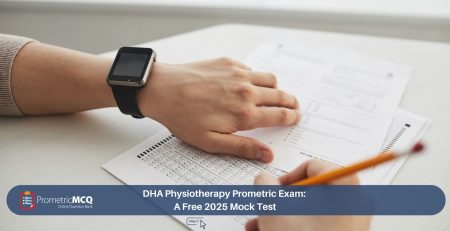
Your Complete DHA Prometric Exam Study Plan for Success
fatima@prometricmcq.com2025-09-14T15:15:26+00:00Table of Contents
ToggleYour Complete DHA Prometric Exam Study Plan for Success
The decision to pursue a healthcare career in Dubai is the first step on a challenging yet incredibly rewarding journey. The Dubai Health Authority (DHA) Prometric exam is the pivotal milestone in this process, a comprehensive assessment designed to validate your clinical skills against the highest international standards. While many candidates possess the requisite knowledge, the differentiating factor between passing and failing often comes down to one thing: a strategic, well-executed study plan.
Attempting to prepare for the DHA exam without a structured plan is like trying to navigate a complex city without a map. You might eventually get there, but you’ll likely waste a significant amount of time, energy, and resources along the way. A robust study plan provides direction, ensures comprehensive coverage of the material, builds confidence, and, most importantly, transforms a daunting task into a series of manageable, achievable steps. This guide is designed to be your personal architect for building that plan. We will walk you through a proven, phased approach, from foundational content review to high-intensity exam simulation, providing you with a complete framework for success.
Key Takeaways for Your Study Plan
- The 12-Week Framework: A 12 to 14-week study period is optimal, divided into three distinct phases: Foundational Review, Intensive MCQ Practice, and Final Simulation.
- Active Recall is Everything: Your plan must prioritize active learning (solving practice questions) over passive learning (rereading notes).
- Consistency Beats Cramming: 2-3 hours of focused study every day is far more effective than 10-hour marathon sessions on weekends.
- Data-Driven Approach: Use the analytics from your question bank to identify and ruthlessly target your weak areas.
- Health is a Priority: Your study plan must include scheduled breaks, adequate sleep, and healthy habits to prevent burnout and optimize cognitive function.
The Anatomy of a World-Class DHA Study Plan: The Three-Phase Approach
A successful plan is not static; it evolves as you progress. We recommend a 12-week framework, which can be compressed to 10 or expanded to 14 depending on your starting knowledge and daily time commitment. This framework is central to any effective DHA Prometric exam preparation strategy.
Phase 1: Building Your Foundation (Weeks 1-4)
Goal: To refresh and solidify your core knowledge across all major subjects covered in your profession’s exam blueprint.
The Strategy: This phase is about breadth, not just depth. The aim is to eliminate major knowledge gaps. You will divide your time between content review from reliable sources (textbooks, review manuals) and introductory practice questions.
Weekly Breakdown:
- Monday-Friday (2-3 hours/day):
- 1.5 hours: Focused content review on a specific topic (e.g., Cardiology for a doctor, Medical-Surgical Nursing for a nurse). Use high-yield review books or your university notes.
- 1 hour: Complete a small, targeted block of 25-30 MCQs on the same topic you just reviewed. Use “tutor mode” if your QBank has it, which shows you the rationale immediately after each question.
- Saturday (3-4 hours): Review the most challenging concepts from the week. Go over all the questions you answered incorrectly and create flashcards or summary notes for them.
- Sunday: Rest. This is non-negotiable and essential for long-term memory consolidation.
Phase 2: Intensive MCQ Practice & Clinical Reasoning (Weeks 5-10)
Goal: To transition from knowing the facts to applying them. This is the most critical phase where you master pattern recognition, clinical reasoning, and time management.
The Strategy: Your focus now shifts dramatically from content review to active problem-solving. Your primary tool is a high-quality, comprehensive QBank. You will learn more from reading the rationales of 75 questions than from reading a textbook for three hours.
Weekly Breakdown:
- Monday-Friday (2.5-3.5 hours/day):
- 1.5 hours: Complete one timed, mixed-subject block of 75-100 MCQs. This simulates the random nature of the exam and forces you to switch between topics.
- 2 hours: Meticulously review every single question from that block. For each question, ask: Why was the right answer correct? Why were the other options (distractors) incorrect? What is the core clinical principle being tested?
- Saturday (4 hours): Deep dive into your weakest area as identified by your QBank’s performance analytics. If you’re struggling with Pharmacology, for example, spend this time reviewing drug classes and mechanisms, then do a 50-question block solely on that subject.
- Sunday: Rest and light review of flashcards from the week.
Phase 3: Final Simulation and Refinement (Weeks 11-12)
Goal: To build mental stamina, perfect your pacing, and walk into the exam feeling confident and prepared for the marathon.
The Strategy: In this final phase, you will treat your study sessions like the real exam. Full-length mock exams are the centerpiece of this phase.
Weekly Breakdown:
- Twice a week (e.g., Tuesday and Friday):
- 3 hours: Take a full-length, 150-question mock exam in one sitting under strict, timed conditions. No interruptions.
- Following Day (4-5 hours): Dedicate the entire next day to an exhaustive review of that mock exam. This review is more important than the test itself.
- Other Study Days: Focus on light, targeted review. Go over your summary notes, flashcards, and do small blocks of questions on topics you’ve historically found difficult.
- The Day Before the Exam: DO NOT STUDY. Your brain needs to rest. Pack your bag, confirm your Prometric center location, and do something relaxing.
Your study plan is a living document. If you find a particular topic is taking longer than expected, adjust your schedule. The goal is mastery, not just ticking boxes on a calendar.
Customizing Your Plan: Sample Weekly Schedules
While the three-phase framework is universal, the content will differ. Here’s how a sample week in Phase 2 might look for different professions:
| Day | General Practitioner Plan | Registered Nurse Plan | General Dentist Plan |
|---|---|---|---|
| Monday | 75 mixed MCQs (Internal Med, Peds, OBGYN). Review rationales. | 75 mixed MCQs (Med-Surg, Fundamentals, Pharm). Review rationales. | 75 mixed MCQs (Operative, Endo, Perio). Review rationales. |
| Tuesday | 75 mixed MCQs. Review rationales, focusing on diagnostic criteria. | 75 mixed MCQs. Review rationales, focusing on prioritization (ABC). | 75 mixed MCQs. Review rationales, focusing on treatment planning. |
| Wednesday | 75 mixed MCQs. Review rationales, focusing on pharmacology. | 75 mixed MCQs. Review rationales, focusing on patient safety/infection control. | 75 mixed MCQs. Review rationales, focusing on dental materials. |
| Thursday | 75 mixed MCQs. Review rationales. | 75 mixed MCQs. Review rationales. | 75 mixed MCQs. Review rationales. |
| Friday | 75 mixed MCQs. Review rationales. | 75 mixed MCQs. Review rationales. | 75 mixed MCQs. Review rationales. |
| Saturday | Deep Dive: Review weakest area from QBank analytics (e.g., ECG interpretation). | Deep Dive: Review weakest area (e.g., Fluid & Electrolyte imbalances). | Deep Dive: Review weakest area (e.g., Radiographic interpretation). |
| Sunday | Rest / Flashcard Review | Rest / Flashcard Review | Rest / Flashcard Review |
Frequently Asked Questions (FAQs) About Your Study Plan
Consistency is more important than intensity. For most candidates, especially those working full-time, 2-3 hours of focused, high-quality study on weekdays and 4-5 hours on one weekend day is a sustainable and effective goal. Quality of study (i.e., active recall with MCQs) is far more important than the number of hours spent passively reading.
You must be efficient. Utilize “dead time” like your commute to listen to medical podcasts or review flashcards on your phone. On workdays, aim for one focused hour of MCQ review. On your days off, schedule your longer 4-5 hour study blocks. A 14-16 week timeline might be more realistic than a 12-week one.
Never just “do” questions. Always use timed mode to simulate the exam. Meticulously review every single question, both correct and incorrect. Create a study journal or flashcards for concepts you got wrong. Use the QBank’s analytics to find your weak areas and dedicate extra study time to them.
This is a common plateau. It means you’ve likely maxed out on your current knowledge base. Stop just doing more random questions. Take a step back. Use your analytics to identify your 3-4 worst-performing subjects. Go back to Phase 1 for those specific topics only—spend a few days reviewing the fundamental concepts from a textbook before re-introducing MCQs on that topic.
High-yield topics are the core clinical concepts that are most frequently tested. These include common diseases (e.g., diabetes, hypertension), patient safety principles, infection control, and medical emergencies. A good QBank will naturally have more questions on these topics, and reviewing the official DHA exam syllabus outline can also provide valuable clues.
A combination is best. In Phase 1, studying one subject at a time helps build a solid foundation. In Phase 2 and 3, using mixed-subject blocks is crucial. This technique, known as “interleaving,” is scientifically proven to improve long-term retention and better prepares you for the random nature of the real exam.
Find a quiet, dedicated space where you will not be interrupted. Put your phone in another room or use an app to block distracting websites. Techniques like the Pomodoro Technique (25 minutes of focused work followed by a 5-minute break) can be highly effective at maintaining concentration.
This depends on your personality. The core of your study (doing and reviewing MCQs) should be done alone to facilitate deep focus. However, a small, dedicated study group (2-3 people) can be very beneficial for meeting once a week to discuss difficult concepts and keep each other motivated.
The final week is for consolidation, not cramming. Focus on light review of your notes and flashcards. Do a few short blocks of questions to stay sharp. Above all, prioritize sleep, good nutrition, and stress management. The day before the exam, do nothing study-related.
Your QBank scores and mock exam results are your key performance indicators. You should see a gradual but steady upward trend in your scores over time. Don’t be discouraged by daily fluctuations, but look for improvement over a 2-3 week period. If you are not improving, it’s a sign you need to analyze your mistakes more deeply and adjust your strategy.
Conclusion: Your Blueprint for Success
Passing the DHA Prometric exam is a testament to both your clinical knowledge and your discipline. This study plan provides the blueprint, but you are the builder. Success requires commitment, consistency, and a strategic approach. By dedicating yourself to this structured plan, you are not just preparing to pass a test; you are laying the foundation for a successful and rewarding healthcare career in Dubai. Trust the process, work smart, and you will achieve your goal.
Ready to Put Your Plan into Action?
Empower your study plan with our comprehensive, high-yield question banks and study materials, specifically designed to mirror the DHA exam format and content.










